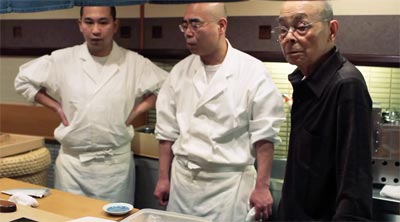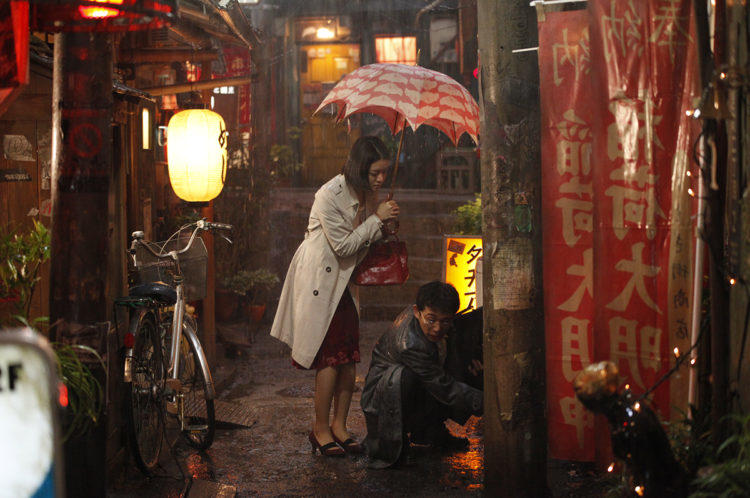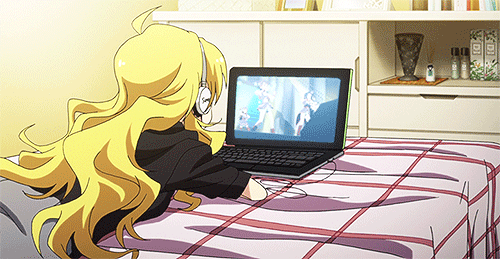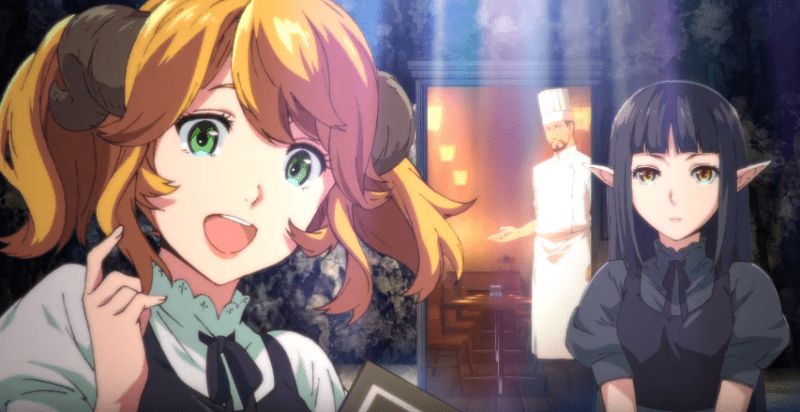
The premise of Restaurant to Another World struck me as odd at first, but I gave the show a try anyway and found it surprisingly charming. The story lacks depth. You really don’t get to know the visitors or characters of the restaurant. The owner of the restaurant is confident, capable, and mostly unshakeable–other than being shaken by the occasional dragon, but he is otherwise a flat character. We learn little about him. The series is structured around a visitor-of-the-week format. A new person discovers the magical door that takes them from a medieval fantasy world to a modern eatery of our world. Once there, the visitor discovers the wonders of unique dishes unavailable in their world.
The anime spends a fair bit of time on the food itself, lavishing animation frames on it and dwelling on each visitor’s thoughts and feelings. While it is fun to consider how a first encounter with say, fried pork, would be for a person who doesn’t have electricity, I found the idea of the restaurant the most interesting idea. In fact, the restaurant itself is the most interesting character.
Visitors go out of their way to seek the restaurant out. It’s seen as a treasure. The door to it appears on the seventh day of each week and allows a visitor to pass through only once. It becomes a destination each week–something to anticipate. For many characters, the restaurant is akin to visiting an old friend. It is a place of peace that unites people from across the fantasy world. Many of whom wouldn’t meet or speak otherwise. The atmosphere of the restaurant–its sanctuary nature–charmed me when I first watched the show. It welcomes people of all types, from lizards to elves to fairies to dragons. It’s a place of safety and a place to linger.
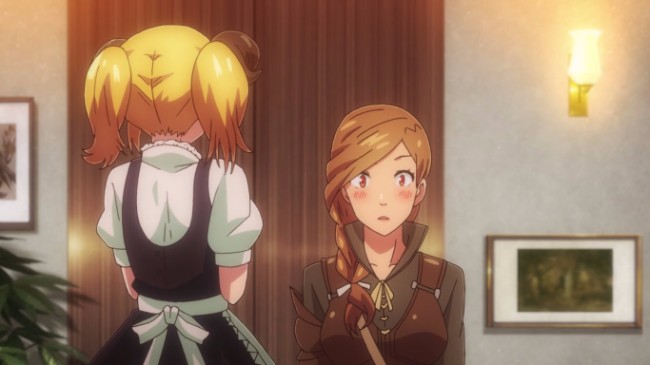
Lingering is a key theme. The camera lingers long on the food served at the restaurant and the environment of the restaurant too. Yet, I didn’t find this lingering a problem. Each time a visitor first enters, they stop and take in the environment: the air conditioning or the heat, the polish of the tables, the cleanliness, the photos hanging on the walls, the record player, and other small details they had never seen before. Restaurant to Another World teaches us the value of pausing and savoring. We interact with our environment superficially. We eat quickly and overlook our environment. We don’t savor. Now, it helps to encounter something new. New forces us to slow down, but many of the visitors to the restaurant are regulars. They eat the same dish each week and even sit in the same place, yet they still savor and appreciate the ability to do so each week. It suggests that we too can appreciate something that is routine.
When you think about it, modern life is magical. We have light at the flick of a switch. We control the comfort level of the environment in ways people in the past could not. Visitors to the restaurant noticed these things because it was outside their normal experience. But we don’t have to be deprived to appreciate. We merely have to stop and ponder, if only for a moment. Aside from being a show about food, Restaurant to Another World is about mindfulness–being mindful of the environment, food, and others. Throughout the show, the camera takes a moment to pan across the silent seating area. People are sharing the space and the savoring. Of course, it’s not always peaceful. Sometimes arguments break out about what dish is superior to the other. The arguments often amuse the older regulars.
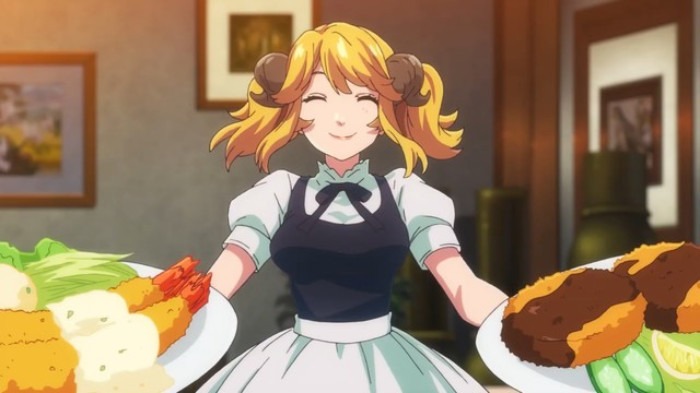
The anime shares much in common with Midnight Diner: Tokyo. Both center on visitors to the warm, welcoming environment and focusing on slivers of their lives. I’ve sat in restaurants and pondered people as they go in and out. Who are they? What do they do? What are their hobbies? The anime actually follows many of them and does a decent job of capturing their wonder and anticipation for the 7th day of each week.
Beneath the anime is the concept of the Sabbath. This required day of rest has gotten lost in our on-the-go world, but its required for human well-being. We aren’t meant to go all the time. We need a day to rest, reflect, and, of course, eat. The master of the restaurant wants merely for his visitors to rest and enjoy themselves during their visit. It’s much the same with how God in the Hebrew Bible wants people to enjoy the Sabbath:
Then he said to them, “This is what the Lord has said: ‘Tomorrow is a Sabbath rest, a holy Sabbath to the Lord. Bake what you will bake today, and boil what you will boil; and lay up for yourselves all that remains, to be kept until morning.” –Exodus 16:23
And behold, there was a man who had a withered hand. And they asked Him, saying, “Is it lawful to heal on the Sabbath?”—that they might accuse Him.
Then He said to them, “What man is there among you who has one sheep, and if it falls into a pit on the Sabbath, will not lay hold of it and lift it out? Of how much more value then is a man than a sheep? Therefore it is lawful to do good on the Sabbath.”
–Matt. 12:10-12.
On the Sabbath, you aren’t even supposed to cook. Instead, clean up the left overs. Of course, in the anime the restaurant takes care of all of that for the visitors. The point of the 7th day is to rest from all work. That means no lawn work, house cleaning, cooking, or any other work. It’s a day for hobbies (which are not work), family, friends, good deeds, and rest. Our modern world desperately needs the Sabbath, but despite the inability of society to force such a day now, you can still carve out a day, or even just an afternoon, to visit the Restaurant to Another World.
